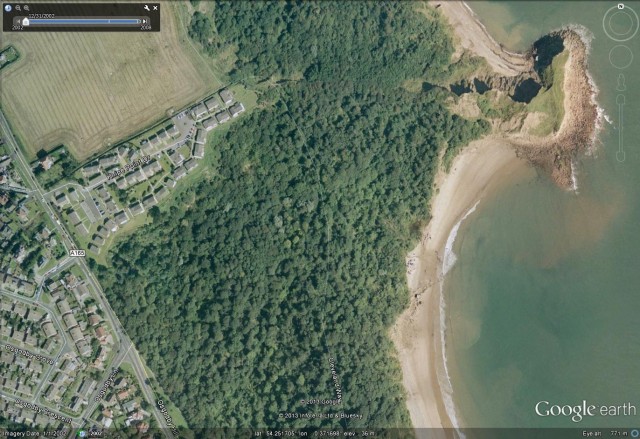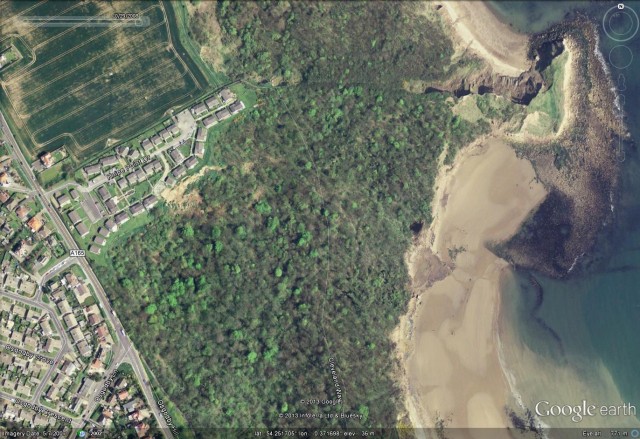11 February 2013
The Knipe Point landslide – arguments over the cause of the failure
Posted by Dave Petley
An a few occasions over the last few years I have blogged about the landslide at Knipe Point, near to Scarborough, in North Yorkshire. My first post was about the initial landslide problem, then subsequently about the range of options at the site, and also about an interesting art project that is underway in one of the threatened houses. As a reminder, Knipe Point is a collection of houses located at crest of an ancient coastal landslide in glacial till – in recent years the landslide has retrogressed (enlarged), damaging houses in the process, as the before (2002) and after (2008) Google Earth images show:
Unsurprisingly, in the current very wet weather in the UK the landslide has reactivated, and a further four houses are now to be demolished. Given the degree to which landslides have been active across the UK in recent months, this is not unexpected. However, a war of words has now broken out between the owners of the houses and the local water company (Yorkshire Water) and a local chip factory (McCain’s) over who is responsible for the landslide. The residents have always been suspicious of aspects of the landslide – and in particular on whether a leak in the water pipe that takes waste water from the McCain’s factory, inland of the site, to be discharged to the sea might be responsible. The residents had observed that water flow was intermittent, which suggested to them that a leak in the pipe might be responsible. Unsurprisingly, Yorkshire Water and McCain’s take a different view.
In the context of most recent landslide events, the residents have been vocal about this issue. Their case is supported by a consultant’s report that they commissioned to examine the water chemistry both in the pipeline and on the cliff. The report is available online here – the conclusions are clearly stated:
“In conclusion, based on the testing undertaken to date and the assessment of the results the most likely source of the water issues at the cliff below Knipe Point appears to be the Yorkshire Water pipeline to the north of the site, as recent improvement works appear to have remedied the problem of the frequent water issues. In addition there is a strong correlation between the chemical content of the issuing water and the effluent water in the pipeline.”
I am no groundwater chemist, so am not qualified to comment on the analysis that is contained within the report. However, I do find it surprising that water issuing from the cliff contained for example starch. However, this weekend Yorkshire Water have responded with a claim that the water has not come from their pipes:
But last night Yorkshire Water responded to claims that water appearing from the cliff at Knipe Point was coming from its pipe which serves McCain’s factory. It said: “We’d like to reassure everyone concerned that our investigations show that our pipe is not to blame in any way for the recent land slippage. Our own checks have also confirmed that the water coming from the cliff is not potable water, meaning that it hasn’t come from any of our drinking water supply pipes in the area. Available evidence would seem to suggest that the landslip was simply an act of nature. Certainly this theory is supported by a larger, earlier study, conducted by the council, which concluded that this stretch of coastline is geologically active, leading to periodic landslips.”
The cause of the movement events over the last five years is unclear. This is a natural landslide that might be expected to retrogress during very wet periods. However, the residents might argue that the allegedly leaking pipe caused a destabilisation of this piece of land, and that in turn meant that the landslide was more active in the recent wet weather. I should stress here that I do not have enough information to take a view either way, and please do not read any of the above as an indication that I think one side or the other has a stronger case, but this is certainly a fascinating subject. While I will watch with interest what happens next, the very difficult circumstances in which the owners of these houses find themselves must not be forgotten.
It would be interesting to see comments from those who are better qualified in geochemistry than am I.




 Dave Petley is the Vice-Chancellor of the University of Hull in the United Kingdom. His blog provides commentary and analysis of landslide events occurring worldwide, including the landslides themselves, latest research, and conferences and meetings.
Dave Petley is the Vice-Chancellor of the University of Hull in the United Kingdom. His blog provides commentary and analysis of landslide events occurring worldwide, including the landslides themselves, latest research, and conferences and meetings.
Well I had no eleven. Survey etc showed no instability whatsoever and a mortgage was available. Without question the landslide was caused by mc cains. I used to walk along the walk from knifepoint to the queens. The queens went. I had just sold no eleven. I could not believe it when I saw it on tv. That was negligence.